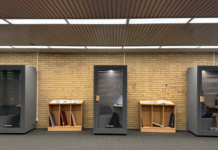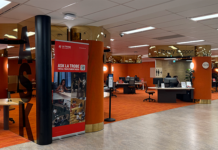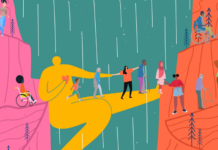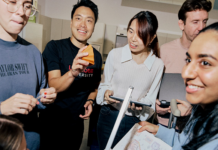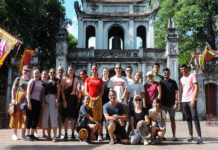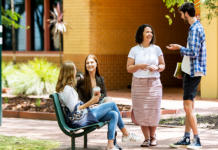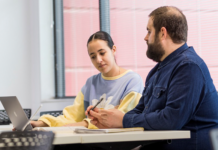Authors: Beth Radulski and Nyssa Jaworowski
La Trobe University’s Olga Tennison Autism Research Centre (OTARC) recently announced it is the recipient of a $45-million bequest from its namesake Mrs Olga Tennison—one of the largest donations ever received by an Australian university. This new opportunity to invest in Neurodiversity research opens the door for La Trobe to change the landscape of Neurodiversity research in Australia and internationally. The outputs from these new and upcoming research projects hold huge potential to improve social, educational, and employment opportunities for Autistic people, and Neurominority groups more broadly. How can La Trobe help to solve big issues like social inequity, discrimination, and unemployment for Neurominority groups like Autism, ADHD, Dyslexia, and beyond?
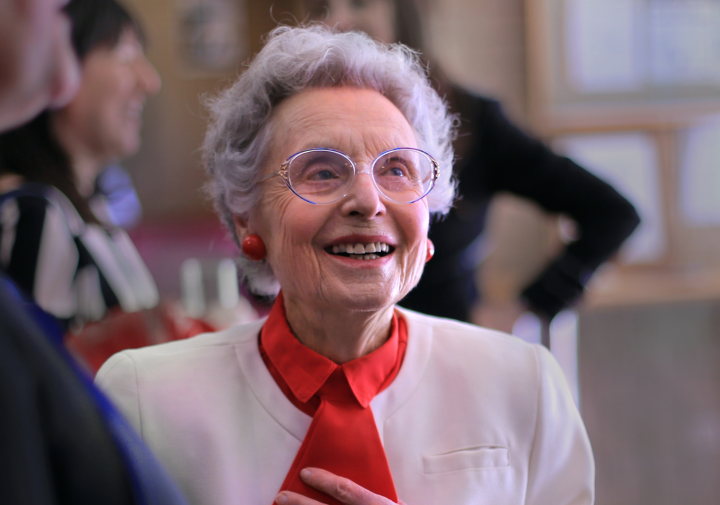
One of OTARC’s Autistic Autism researchers Kate Gore notes that La Trobe now has a valuable opportunity to create cultural and social change in the Neurodiversity sphere: “Autistic people experience higher levels of unemployment and underemployment than non-autistic populations. We can help change this by supporting neurodiverse students to access the accommodations and supports they need during tertiary study. This may assist in setting them up for success for when they enter the workplace through an understanding of what works best for each individual.”
OTARC Director Prof. Cheryl Dissanayake believes La Trobe is well equipped to accomplish these aims given its strong cultural emphasis on diversity and inclusion: “In celebrating the full range of neurodiversity and strengthening our capacity at all levels of the University—not only to offer educational access for diverse and underrepresented cohorts but to support neurominorities to excel as both students and staff of La Trobe—we realise our mission as a University for the public good.”
The ongoing La Trobe Neurodiversity Project, led by one of OTARC’s Autistic PhD Candidates Beth Radulski, aims to contribute to these aims, operating with a goal of making La Trobe an inclusive and accessible university and employer of choice for Neurominority groups.
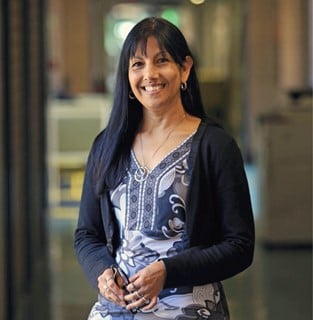
Neurodiversity Project Officer Beth Radulski has seen a huge shift in Neurodiversity acceptance since her PhD began in 2019: “When I first started, I was the first and only openly Autistic researcher at OTARC. Elsewhere, the field as a whole focussed largely on interventions aimed at ‘normalising’ Neurominority groups so they could fit into an inequitable and discriminatory society. Now OTARC is leading the pack in Neurodiversity inclusion, with an entire generation of postgraduate researchers—many of them Autistic—focussing primarily on improving Autistic equity and quality of life across the lifespan.”
OTARC’s academics are also conducting diversity-based research, including a recently co-published toolkit on Autism inclusive employment—a joint effort with DXC technology and ANZ banking. This toolkit is just one of many signs that the widespread changes in research and society’s approaches to Neurodiversity are emerging into industry settings too. Organisations such as Westpac, DXC, and Deloitte are making great strides in evolving to become Neurodiversity friendly employers. Similarly, the Ernst and Young “Neurodiversity Centre of Excellence” program yielded Neurominority employees who matched their peers in efficiency but “excelled at innovation”. La Trobe’s own cultural quality of Innovation comes to mind here: how can we innovate as a university community to support equity, diversity, and inclusion in the Neurodiversity sphere?
Andrew Eddy, co-founder of La Trobe industry partner Neurodiversity Hub, is another example of the industry’s burgeoning interest in neurodiversity. His company creates partnerships with universities and employers to encourage Neurodiversity inclusion and develops resources to support these initiatives. Eddy says “Many organisations have achieved progress in the area of diversity [more broadly], but there is an opportunity to take it further into the area of cognitive diversity… Embracing and celebrating neurodiversity [can] pay immense dividends in further strengthening La Trobe’s educational offering, and increasing the diversity of the student and academic population.”
VC Prof. John Dewar (AO) is optimistic about how La Trobe’s Neurodiversity Project can contribute to improving workplace outcomes for Autistic people through partnering with industry in this area: “One of our objectives in the City of the Future initiative is to attract more industry partners to co-locate with us… The private sector, and particularly the IT sector, is very alive to the opportunities that being neurodiversity supportive offers their organisations, because they know that there are uniquely talented individuals who can contribute massively to their organisation.”
As society shifts its aims to embracing Neurodiversity as the next frontier, sustaining La Trobe’s existing commitment to these aims, and securing it for the future, can produce positive change for both society and the university. Professor Dewar concludes: “[At La Trobe] we’ve got huge research expertise, we’ve got very talented neurodiverse students who are prepared to proclaim themselves as such, and we’ve got experience of working with employers to develop neurodiverse employee [cohorts]—it’s a leading-edge for the university to be able to offer this to potential partners… For me, having neurodiversity high on our list of priorities is part and parcel of being an institution that is accepting, inclusive, and experienced by a wide diversity of people to be these things… In terms of student and staff [inclusion], it makes us stronger, because it means that we can hear more perspectives, hear more voices, and make better decisions as a result.”
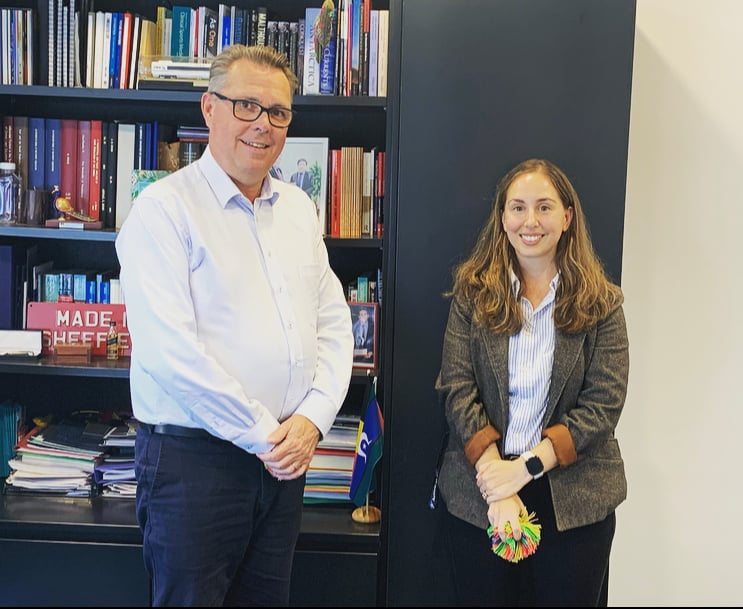
Mr. Andrew Eddy, whose Neurodiversity Hub employee cohort comprises of 71.4% Neurominority employees, explains that supporting Neurodiversity must include: “being cognisant of potential hyper-sensitivities (sensory avoiding) or hypo-sensitivities (sensory seeking)… and striving for an environment that… provides for effective accommodations. Sensitivities are broad and can include sound, light, smell and touch…. [Supports can] include providing wayfaring to navigate the ‘sensory jungle of the workplace’, alternatives to fluorescent lighting, noise-cancelling headphones, quiet spaces for sensory recovery, alternatives to air blow dryers [in bathrooms], guidelines around the use of perfumes and other sources of strong smells and the mainstreaming of fidget toys.”
DVC Students Prof. Jessica Vanderlelie further explains: “as we work toward rethinking our spaces in the context of flexible work… we have a powerful opportunity to address the sensory challenges that our current spaces create. The City of the Future will, by design, provide La Trobe with the opportunity to consider how spaces can create a safe, inclusive and supportive campus experience for Neurominorities and we are excited to challenge our approaches and what is possible through intentional space design and creation”.
VC Prof. John Dewar (AO) specifies that, in measuring La Trobe’s success in the equity, diversity, and inclusion sphere more broadly, it is imperative to listen to marginalized voices—including Neurominorities: “If we hold ourselves out to be certain things like ‘inclusive’—I think a lot of people are very proud to be at La Trobe for that reason— it’s always useful I think to come to that question of whether we ‘walk the talk’ from the point of view of someone who is in a potentially marginalised group. How well are we doing from the perspective of someone who is at risk of not feeling fully a part of the university? If a Neuro[minority] person is not experiencing that inclusiveness, then we’re falling short, and we should hold ourselves accountable for that. I think that can help strengthen and reinforce the way we measure our progress towards our goals.”
To ensure an intersectional approach to exploring the lived experience of Neurominority groups, the Neurodiversity Project reached out to several La Trobe community members representing both Neurominority identities and other marginalized groups. These include Neurominority people who are also women, first-in-family and/or regional students, People of Colour, or who identify as LGBTQIA+. They shared the following views on their experiences thus far, and the directions the university should be aiming for in the future.
OTARC Autistic Autism researcher Kate Gore explains: “[I led] a qualitative research study in my Masters degree investigating the experiences of Autistic working mothers. I interviewed ten Autistic working mothers… discover[ing] that while Autistic working mothers experience many of the same gendered challenges as non-autistic working mothers, they also experience additional challenges related to the lack of societal understanding of female Autistic experiences, referred to as the ‘invisible disability’. These women had effectively ‘three layers’ of invisible disability – one related to their Autism, a second related to gender, and a third related to parenting neurodiverse children.” Gore’s work on employment for Autistic women demonstrates how La Trobe’s commitment to gender equity through the Athena Swan Gender Equity framework can benefit from an intersectionally informed and Neurodiversity friendly approach.
ADHD lecturer Dr. Rebecca Flower offers similar sentiments in the context of how La Trobe’s support for First-in-Family, regional, and socio-economically marginalized cohorts can benefit from an added focus on Neurodiversity: “I’m a first in family university graduate who grew up in a regional area… Given I often felt like an imposter who wasn’t able to learn in the same way as others… without this approach, I may not have continued studying (and therefore, wouldn’t have gotten to where I am today, in a job that I love)… Celebrating neurodiversity encourage[s] neurodivergent people to feel that they can go to university and do have what it takes. When those people don’t have family members to ask about the university experience, this could make a huge difference.”
Autistic Alumnus JoJo Fernando articulates how La Trobe’s approach to diversity enriched their education: “I’m a Sri Lankan Tamil and first-generation Australian who identifies as non-binary. Upon reflection, I can honestly say my time at La Trobe was the only years of my education I genuinely enjoyed. I have attended other universities since graduating and what became clear is that… La Trobe values the diversity of thought [and] this is the place if you want to have genuine, meaningful discourse across a range of paradigms. I remember one class where our tutorial groups got heated, students pouring their hearts out and the tutor egging us on, encouraging us to think deeply about our underlying assumptions and internalised biases. La Trobe is a leading institution because it does not tell students what to think, but how to think, an increasingly invaluable skill in the current socio-political climate… Not only will adding Neurodiverse voices expose future students to ideas and/or perspectives they may not have considered or even heard of, encouraging greater understanding, but it also serves to unite Neurodiverse people and people from other marginalised groups to find solutions that benefit the maximum amount of people.”
Dyslexic AccessAbility Hub staffer Steven Zelko studied at La Trobe in the early-2000’s and has been employed by the university for nearly twenty years. Recalling his early days at La Trobe—decades before the Neurodiversity paradigm gained widespread recognition—Zelko recounts how meaningful it has been to see the university transform in the field of Neurodiversity: “[When I got hired] I had just finished an English Lit degree, [and] almost quit several times… I genuinely thought I was just a lazy student. I had no idea that I was having to work several times harder just to even approach what would be considered normal for other students… [Then] my boss realised something was off with the work I was doing. I wasn’t keeping the same pace as others in formatting documents, and I approached them in a very different fashion. It was clear to him that I was dyslexic. [He said] ‘Well, we better go see the manager, because I’m not sure you can actually do the job.’ And off we went… Luckily my supervisor at the time recognised the need for lived experience and inclusivity way back then [and] used my insights to deliver options to students with a similar [dyslexic] experience who were coming to us for aid…. [Now working in AccessAbility Hub] I get the ability, on a daily basis, to right a wrong that was done to me through [improving] the experience of others”.
VC Prof. John Dewar (AO) asserts that continuing to work toward Neurodiversity inclusion at La Trobe will “help to inform better practice across the board: The better we get at being inclusive of neurodiversity, I think the better we get at being inclusive of many other disadvantaged, alienated, or Othered groups that we need to be better at allowing to be and feel included in the university”.
So where will the Neurodiversity Project head in the future? As a university, particularly in light of OTARC’s enhanced research capacity, we have an unprecedented ability to play a pioneering role in righting Neurominority inequity in society more broadly.
Neurodiversity Project Officer Beth Radulski offers: “Here at La Trobe, we need to be educating the next generation of the workforce on Neurodiversity as both a movement and best practice for inclusion. Right now we’re working on offering new Neurodiversity Work Integrated Learning subjects available to students who study in Neurodiversity related fields, and/or who identify as Neurominorities themselves. As a university, we train society’s future researchers, psychologists, educators, social workers, business leaders, and beyond—and with Neurodiversity rapidly becoming the next frontier in these fields, our graduates can and should be the first generation to enter the workforce with the in-demand skills needed to support Neurodiversity inclusion. Only once we strive for widespread societal change like this will Neurominority groups begin to see better outcomes in education, employment, and social life. If my time at La Trobe has taught me one thing, it’s that to solve big issues like this, we need to work as a team to succeed in our cultural qualities: we show we Care by being Accountable, Connected, and Innovative—and above all else, we are a university that celebrates being ‘All Kinds of Clever’—so what better place to change the world than right here at La Trobe?”
If you are a potential industry partner or student/staff member who would like to get involved with the Neurodiversity Project, please contact Beth Radulski at Neurodiversity@latrobe.edu.au
Part One – An Interview with Autistic Undergrad Nicole Missios
Part Two – Higher Education Access and Employment
To celebrate Neurodiversity Celebration (March), Autism Acceptance (April), and Mental Health (May) season, this article is part two of a three-part series bringing together some La Trobe’s leading thinkers in the neurodiversity sphere for a panel discussion. This series explores how our Neurodiversity Project and university culture, vision, and community can work together to help us become an accessible university and employer of choice for Neurominority groups. The panel includes a diverse range of staff and students who identify as Autistic, ADHD, and/or Dyslexic, several members of the Senior Executive Group, and leading researchers and industry partners in this area.
